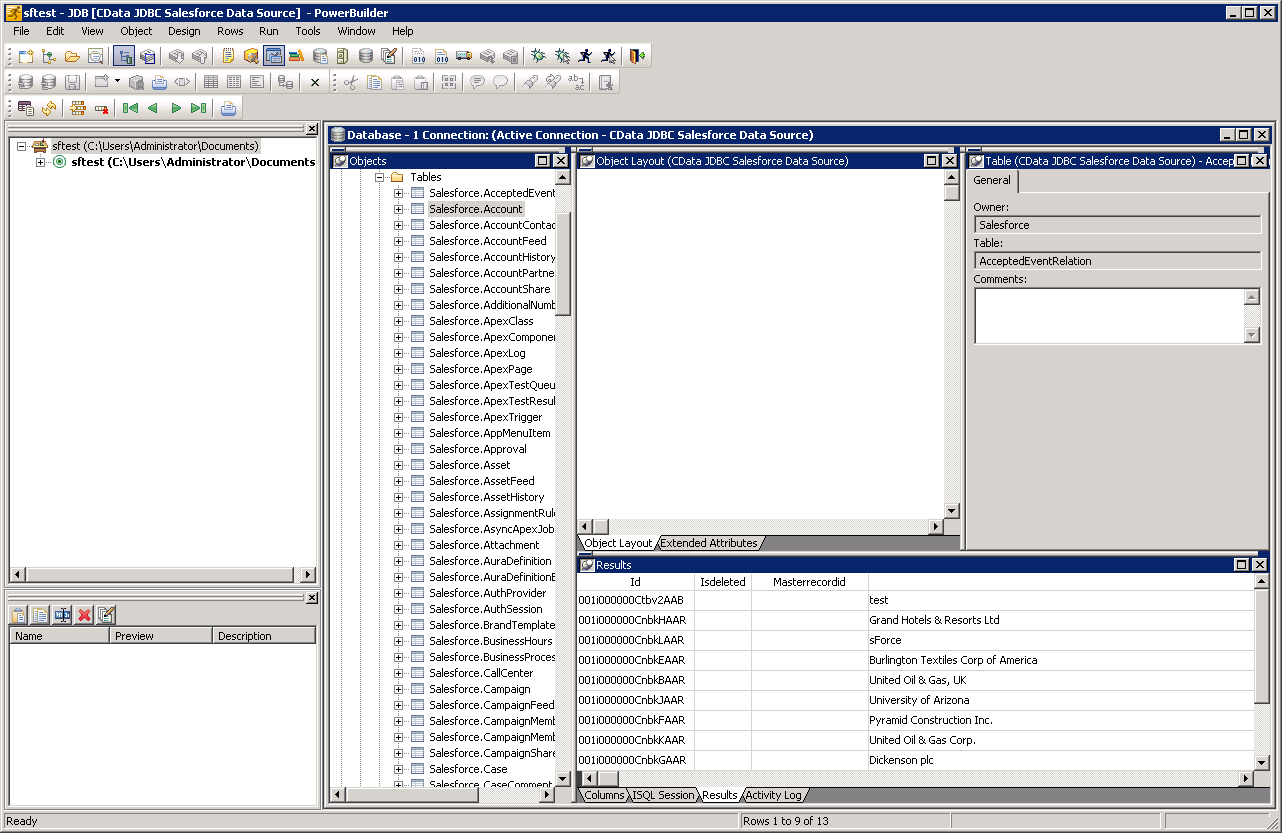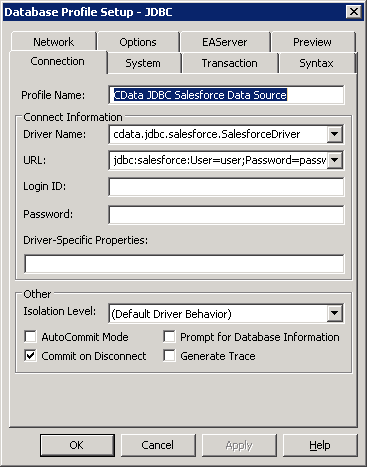Discover how a bimodal integration strategy can address the major data management challenges facing your organization today.
Get the Report →Connect to Google Data Catalog Data from PowerBuilder
This article demonstrates how to access Google Data Catalog data from PowerBuilder using the Google Data Catalog JDBC Driver.
The CData JDBC Driver for Google Data Catalog is a standards-based control that can be used from any platform or development technology that supports JDBC, including PowerBuilder. This article shows how to use the CData JDBC Driver for Google Data Catalog in PowerBuilder.
This article shows how to create a basic PowerBuilder application that uses the CData JDBC Driver for Google Data Catalog to retrieve data.
Connect to Google Data Catalog Data from PowerBuilder
Follow the steps below to use the Database Painter tool to create a database profile based on an JDBC URL for Google Data Catalog. You can use a database profile to save connection properties. In the Database Painter, you can graphically manipulate data as well as execute SQL queries.
Add the driver JAR to the PowerBuilder classpath. Set the CLASSPATH system environment variable to the path to the driver JAR, located in the lib subfolder of the installation directory.
Note: If you are using PowerBuilder Classic, you can also add the path to the driver JAR by clicking Tools -> System Options -> Java.
- Click Tools -> Database Painter.
- Right-click the JDBC node and click New Profile.
- In the Database Profile Setup dialog, enter the following:
- Profile Name: Enter a user-friendly name for the profile.
- Driver Name: Enter the class name of the driver, cdata.jdbc.googledatacatalog.GoogleDataCatalogDriver
- URL: Enter the JDBC URL.
Google Data Catalog uses the OAuth authentication standard. Authorize access to Google APIs on behalf on individual users or on behalf of users in a domain.
Before connecting, specify the following to identify the organization and project you would like to connect to:
- OrganizationId: The ID associated with the Google Cloud Platform organization resource you would like to connect to. Find this by navigating to the cloud console.
Click the project selection drop-down, and select your organization from the list. Then, click More -> Settings. The organization ID is displayed on this page.
- ProjectId: The ID associated with the Google Cloud Platform project resource you would like to connect to.
Find this by navigating to the cloud console dashboard and selecting your project from the Select from drop-down. The project ID will be present in the Project info card.
When you connect, the OAuth endpoint opens in your default browser. Log in and grant permissions to the application to completes the OAuth process. For more information, refer to the OAuth section in the Help documentation.
Built-in Connection String Designer
For assistance in constructing the JDBC URL, use the connection string designer built into the Google Data Catalog JDBC Driver. Either double-click the JAR file or execute the jar file from the command-line.
java -jar cdata.jdbc.googledatacatalog.jarFill in the connection properties and copy the connection string to the clipboard. A typical JDBC URL is below:
jdbc:googledatacatalog:ProjectId=YourProjectId;InitiateOAuth=GETANDREFRESH - OrganizationId: The ID associated with the Google Cloud Platform organization resource you would like to connect to. Find this by navigating to the cloud console.
![The JDBC data source defined in the Database Profile Setup dialog. (Salesforce is shown.)]()
- To view and modify a table, right-click a table and then click Edit Data -> Grid.

Using Google Data Catalog Data with PowerBuilder Controls
You can use standard PowerBuilder objects to connect to JDBC data sources and execute queries. The following example shows how to retrieve Google Data Catalog data into a DataWindow. You can add the following code to the open method:
SQLCA.DBMS = "JDBC"
SQLCA.AutoCommit = False
SQLCA.DBParm = "Driver='cdata.jdbc.googledatacatalog.GoogleDataCatalogDriver',URL='jdbc:googledatacatalog:ProjectId=YourProjectId;InitiateOAuth=GETANDREFRESH";
CONNECT USING SQLCA;
dw_schemas.SetTransObject(SQLCA);
dw_schemas.Retrieve();







